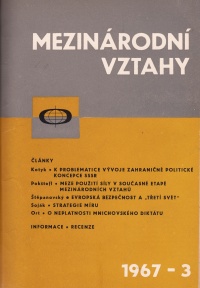Strategy for Peace

Abstract
The combination of these two terms certainly does not seem particularly logical at first glance. After all, the word strategy has always been associated primarily with war, which is the opposite of peace. And this was already a matter of strategy as a long-term plan of one's own military actions for the time and in time of war, or a political and diplomatic strategy as preparation for war. This certainly also included the so-called Cold War, which at the turn of the 1940s and 1950s was understood primarily as a preparation for an actual war. From that time on, the terms "camp of war" and "camp of peace" also remained in the white dictionary, all of them following the idea of two enemy military camps before the battle, as we know it from numerous historical photos and images. This idea does not completely correspond to the military conditions of our time, but the fact remains that war and peace continue to be the basic aspects of international relations, that in the world they must be in the most different forms.
At the same time - as already determined by the essence of the strategy and the conditions of today's world - it is a long-term problem, a lasting peace, peace on a sacred scale, even if, of course, problems limited in time and space cannot be separated from it. However, for peace - just as for war, which forms a dialectical unity with it - it is true that it is a phenomenon of great complexity, historically conditioned, closely connected with overall social development and its progressive and reactionary forces.
The scope of this article cannot, of course, be to show the entire issue of the peace strategy, but above all the main approaches that appear here and which, in my opinion, result from the overall sacred opinion and social setting - that means in today's era of imperialism and socialism (with the specifics of developing countries ). As soon as we try to concretize these approaches, the problem starts to become more complex - within them, other differences and connections emerge - especially the question of status quo and revolution. I project myself further, the issue of the attitude of developing countries, the peace movement, but also the research of peace.
Author Biography
Vladimír Soják
se ve své vědecké práci soustřeďuje na obecné otázky mezinárodních vztahů. Publikoval řadu prací, mj. o vývoji poválečných mezinárodních vztahů.